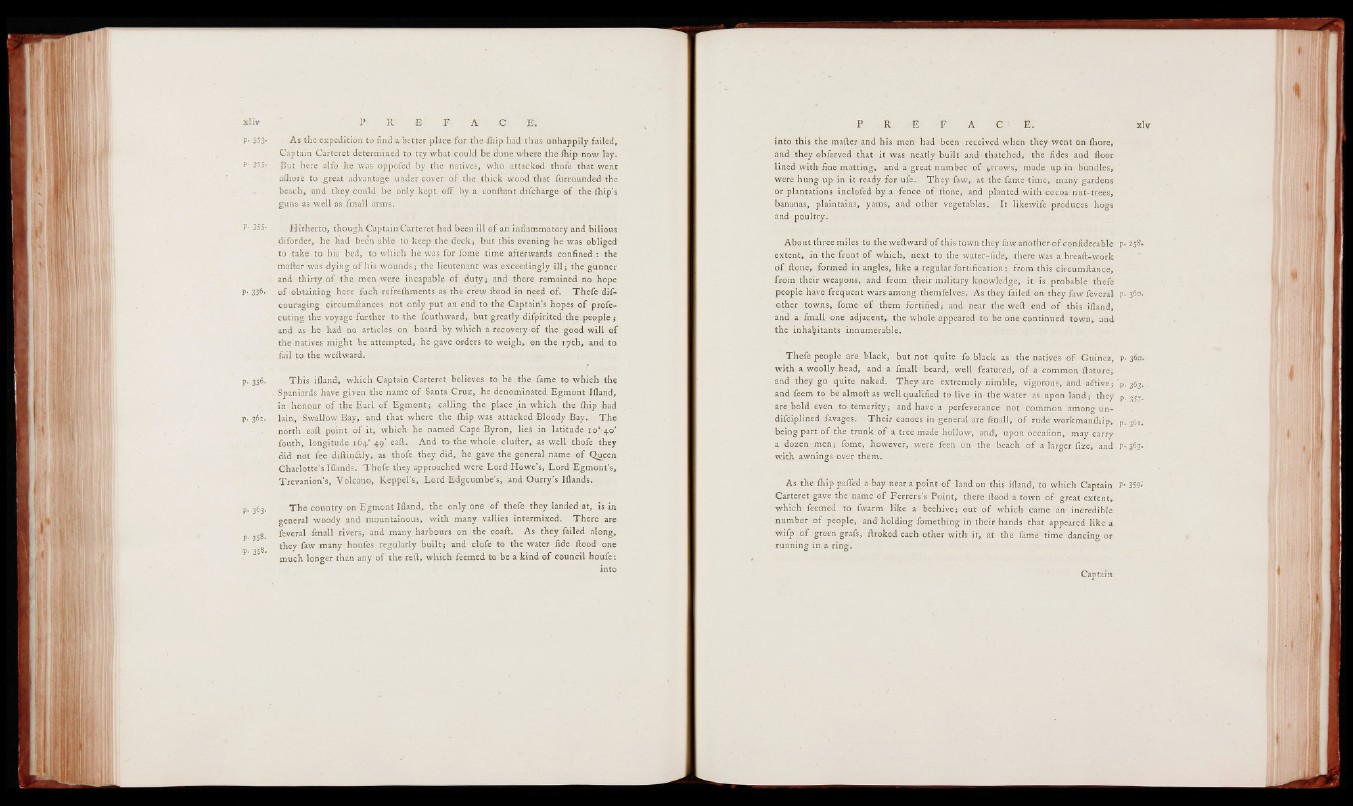
xliv
P- 353-
P- 355-
P* 355-
P- 356-
P- 356.
p. 362.
P- 363*
p . 358.
P- 358.
1 R E F A C E.
As the expedition to find a better place for the ¿hip had thus unhappily failed,
Captain Carteret determined to t r y what could be done where the ihip now lay.
But here alfo he Was oppofed by the natives, who a t ta c k e d thofe that went
aihore to g r e a t advantage under cover of the thick wood that furrounded the
beach, and they could be only kept off by a conftant difcharge of the ihip’s
guns as well as fmall arms.
Hitherto, though Captain Carteret had been ill of an inflammatory and bilious
diforder, he had been able to keep the deck; but this evening he was obliged
to take to his bed, to which he was for fome time, afterwards confined : the
mailer was dying of his wounds; the lieutenant was exceedingly ill; the gunner
and thirty of the men were incapable df duty; and there remained no hope
of obtaining here fuch refreihments as the c r ew ilood in need of. Thefe difi-
couraging circumftances not only put an end to the Captain’s hopes of profe-
cuting the voyage further to the fouthward, but greatly difpirited the people;
and as he had no articles on board by which a recovery of the good will of
the natives m ig h t be attempted, he gave orders to weigh, on the 17th, and to
fail to the weilward.
This ifland, which Captain Carteret believes to be the fame to which the
Spaniards have given the name of Santa Cruz, he denominated Egmont Ifland,
in honour of the Earl of Egmont; calling the place [in which the Ihip had
lain, Swallow Bay, and that where the ihip was attacked Bloody Bay. The
north eaft point of it, which he named Cape Byron, lie s in latitude io ° 40’
fouth, longitude 16 4° 49’ eaft. And to the whole clufter, as well thofe they
did not fee diftindtly, as thofe they did, he gave the general name of Queen
Charlotte’s Iftands. Thofe they approached were Lord Howe’s, Lord Egmont’s,
Trevanion’s, Volcano, Keppel’s, Lord Edgcumbe’s, and Ourry’s Iflands.
The country on Egmont Ifland, the only one of thefe they landed at, is in
general woody and mountainous, with many vallies intermixed. There are
feveral fmall rivers, and many harbours on-the coaft. As they failed along,
they faw many houfes regularly built; and clofe to the water fide flood one
much longer than any of the reft, which feemed to be a kind of council houfe:
into
P R E E A C E.
into this the mailer and his men had been received when they went on fhore,
and they obferved that it was neatly built and thatched, the fides and floor
lined with fine matting, and a great number of ^rrows, made up in bundles,
were hung up in it ready for ufe. They faw, at the fame time, many gardens
or plantations inclofed by a fence of ftone, and planted with cocoa nut-trees,
bananas, plaintains, yams, and other vegetables. It likewife produces hogs
and poultry.
xlv ■i I
About three miles to the weilward of this town they faw another of confiderable p- 258»
extent, in the front of which, next to the water-fide, there was a breaft-work
of ftone, formed in angles, like a regular fortification : from this circumftance,
from their weapons, and from their military knowledge, it is probable thefe
people have frequent wars among themfelves. As they failed on they faw feveral p. 360-,
other towns, fome of them fortified; and near the weft end of this ifland,
and a fmall one adjacent, the whole appeared to be one continued town, and
the inhabitants innumerable.
Thefe people áre black, but not quite f a b la c k as the natives of Guinea, p-360.
with a woolly head, and a fmall beard, well featured, of a common ftature;
and they go quite naked. They are extremely nimble, vigorous, and a<5tive; "p. 363.
and feerti to be almoft as well qualified to live in the water as upon land; they p. 357*
are bold even to temerity; and have a perfeverance not common among un-
difciplined favages. Their canoes in general are fmall, of-rude workman ihip, p. 361.
being part of. the trunk of a tree made hollow, and, upon occafion, may carry
a dozen men; fome, however, w e r eTeen on the beach of a larger fize, and P* 363.
with awnings over them.
HI
As the ihip paired a bay near a point of land on this ifland, to which Captain P- 3S9I
Carteret gave the name of Ferrers’s Point, there flood a town of great extent,
which feemed to fwarm like a beehive; out of which came, an incredible
number of people, and holding fomething in their hands that appeared like a
wifp of green grafs, ilroked each other with it, at the fame time dancing or
running in, a ring.
Captain